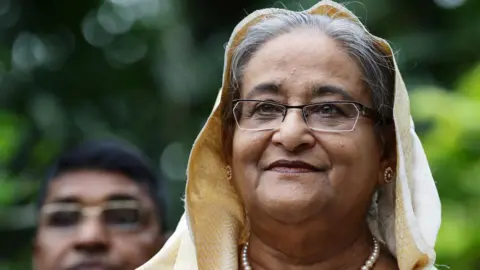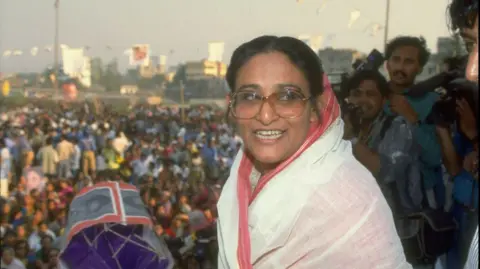Sheikh Hasina: Who is Bangladesh's controversial prime minister?
Getty Images
Ms Hasina has overseen Bangladesh's economic progress but critics say she has also turned autocratic

Bangladesh's Prime Minister Sheikh Hasina Wazed has resigned and left the country after weeks of student-led protests spiralled into deadly, nationwide unrest.
The 76-year-old fled in a helicopter on Monday to India, reports said, as thousands of protesters stormed her official residence in the capital city Dhaka.
This brings an unexpected end to the reign of Bangladesh's longest-serving PM, who has ruled the country for more than 20 years in total.
Credited for overseeing the South Asian country's economic progress, Ms Hasina began her political career as a pro-democracy icon
However, in recent years she has been accused of turning autocratic and clamping down on any opposition to her rule.
In January she won an unprecedented fourth term as PM in a January election widely decried by critics as being a sham.
How did Sheikh Hasina come to power?
Born to a Muslim family in East Bengal in 1947, Ms Hasina had politics in her blood.
Her father was the nationalist leader Sheikh Mujibur Rahman, Bangladesh's "Father of the Nation" who led the country's independence from Pakistan in 1971 and became its first president.
At that time, Ms Hasina had already established a reputation as a student leader at Dhaka University.
Her father was assassinated with most of his family members in a military coup in 1975. Only Ms Hasina and her younger sister survived as they were travelling abroad at the time.
After living in exile in India, Ms Hasina returned to Bangladesh in 1981 and became the leader of the political party her father belonged to, the Awami League.

She joined hands with other political parties to hold pro-democracy street protests during the military rule of General Hussain Muhammed Ershad. Propelled by the popular uprising, Ms Hasina quickly became a national icon.
She was first elected to power in 1996. She earned credit for signing a water-sharing deal with India and a peace deal with tribal insurgents in the south-east of the country.
But at the same time, her government was criticised for numerous allegedly corrupt business deals and for being too subservient to India.
She later lost to her former ally turned nemesis, Begum Khaleda Zia of the Bangladesh Nationalist Party (BNP), in 2001.
As heirs to political dynasties, both women have dominated Bangladesh politics for more than three decades and are known as the "battling Begums". Begum refers to a Muslim woman of high rank.
Observers say their bitter rivalry has resulted in bus bombs, disappearances and extrajudicial killings becoming regular occurrences.
Ms Hasina eventually came back to power in 2009 in polls held under a caretaker government.
A true political survivor, she endured numerous arrests while in opposition as well as several assassination attempts, including one in 2004 that damaged her hearing. She has also survived efforts to force her into exile and numerous court cases in which she has been accused of corruption.
Getty Images
Propelled by the pro-democracy movement in the 1980s and early 1990s, Ms Hasina became a national icon
What has she achieved?

Bangladesh under Ms Hasina presents a contrasting picture. The Muslim-majority nation, once one of the world's poorest, has achieved credible economic success under her leadership since 2009.
It's now one of the fastest-growing economies in the region, even surpassing its giant neighbour India.
Its per capita income has tripled in the last decade and the World Bank estimates that more than 25 million people have been lifted out of poverty in the last 20 years.
Much of this growth has been fuelled by the garment industry, which accounts for the vast majority of total exports from Bangladesh and has expanded rapidly in recent decades, supplying markets in Europe, North America and Asia.
Using the country's own funds, loans and development assistance, Ms Hasina's government has undertaken huge infrastructure projects, including the flagship $2.9bn Padma bridge across the Ganges.
What is the controversy surrounding her?
The latest protests were the most serious challenge Ms Hasina faced since taking office, and follows a highly controversial election where her party was re-elected for the fourth straight parliamentary term.
Amid increasing calls for her to resign, she had remained defiant. She condemned the agitators as “terrorists” and appealed for support to "suppress these terrorists with a firm hand".
The latest unrest in Dhaka and elsewhere began with a demand to abolish quotas in civil service jobs but turned into a wider anti-government movement.
In the wake of the pandemic, Bangladesh has been struggling with the escalating cost of living. Inflation has skyrocketed, its foreign exchange reserves have dropped precipitously, and its foreign debt has doubled since 2016.
Critics have blamed this on Ms Hasina's government's mismanagement, and say that Bangladesh's previous economic success only helped those close to Ms Hasina’s Awami League due to endemic corruption.
They also say the country's progress has come at the cost of democracy and human rights, and allege that Ms Hasina's rule has been marked by repressive authoritarian measures against her political opponents, detractors and the media.
The government and Ms Hasina have denied such allegations.
But in recent months, many senior leaders from the BNP were arrested, along with thousands of supporters following anti-government protests - a remarkable turnaround for a leader who once fought for multi-party democracy.
Rights groups have also expressed concern about hundreds of cases of alleged enforced disappearances and extra-judicial killings by security forces since 2009.
Ms Hasina's government flatly denies claims that it's behind such abuses - but it also severely restricts visits to foreign journalists who want to investigate such allegations.







































































